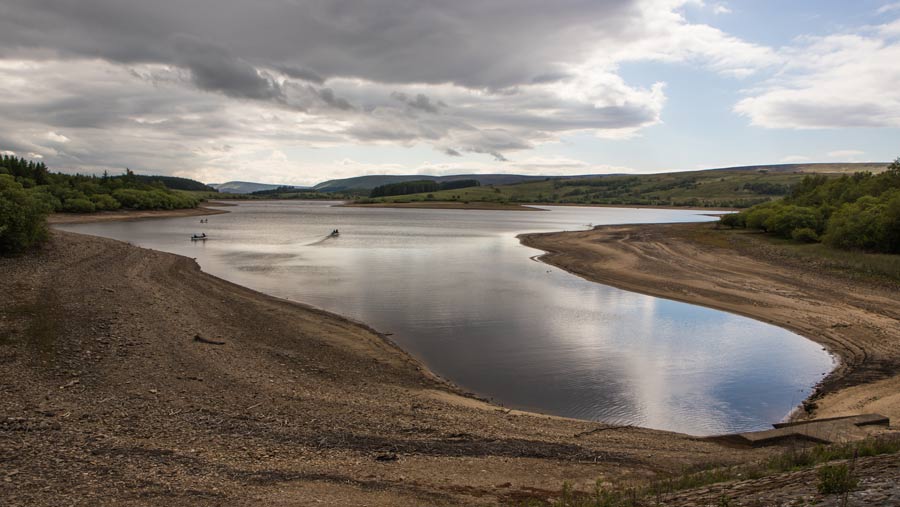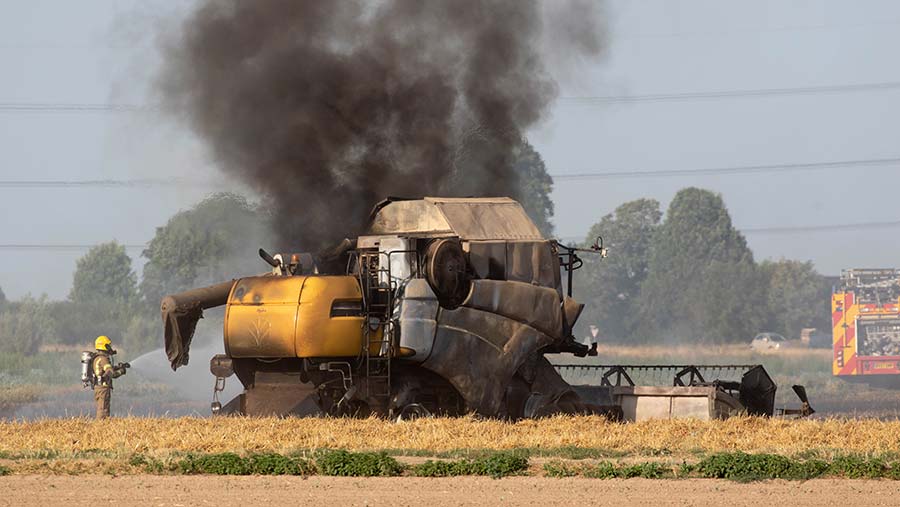Water warnings as Met Office issues first ever ‘Red’ alert
 © Matt/Adobe Stock
© Matt/Adobe Stock With record temperatures of 40C or more forecast by the Met Office in the coming days, farmers are being urged to reduce their water use, where possible, to help conserve dwindling supplies.
Water company South East Water says the region’s daily water use has jumped from a summer average of 540m litres up to 660m litres this week.
See also: Hot, dry weather puts pressure on UK livestock farmers
“As temperatures climb, so does demand for water,” said surface water manager Simon Lohrey.
“That’s why we’re asking farmers to try and reduce their overall water use for the next 10 days. Where possible, avoid using water between 7.30 and 10.00 each morning and evening, when demand across our network is highest.
“Of course you will need to irrigate crops, keep animals hydrated and carry out essential cleaning, but we really appreciate you keeping all non-essential water use to a minimum until the temperature drops.”
The water company has issued the following top tips for saving water on farm:
- Check any pipework, troughs or reservoirs for leaks – and fix them
- Delay irrigation, spraying and any non-urgent water use until the temperatures start to fall
- Avoid washing tractors or yards during this hot spell.
“While all our efforts right now are focused on maintaining water supplies across our network, our dedicated team of farm advisors can offer a range of help and advice,” Mr Lohrey added.
Extreme heat warning
The advice comes as the Met Office has issued its first ever Red Extreme warning for heat, with a 50% chance the 40C barrier could be broken in parts of England or Wales on Monday or Tuesday, and an 80% chance a new record of over 38.7C will be set.
This is the result of the high-pressure system that has been causing this week’s warm weather shifting position.
“A developing southerly flow will allow very high temperatures currently building over the continent to start to spread northwards into the UK,” said a spokesman.
“Further north, eastern areas of Scotland could see temperatures in the high 20s in a few places, well above their average for the time of year.”
Against this background, the Scottish Environment Protection Agency (Sepa) has put 11 more areas at an increased risk of water scarcity in its latest situation report.
The Dee, Firth of Forth, Almond and Tyne catchment areas have been raised to “moderate scarcity”, while the Clyde, Helmsdale, Earn and Spey catchments are now at “alert”. The Ness, Nith and Doon catchments have reached “early warning”.
“The situation continues to deteriorate in the east of the country, with most areas now in ‘alert’ or ‘moderate scarcity’ level,” said Sepa head of water and planning Nathan Crichlow-Watton.
“We’re also now seeing conditions worsen in the South West, and businesses that rely on water in this part of the country should also be thinking about how to be more efficient.”
Reduce abstractions
Farmers in areas with “moderate scarcity” are advised to reduce abstractions by staggering with other operators, reduce the volume, switch to other supplies or suspend abstractions.
Abstractors in “alert” areas should work with neighbouring water users to schedule abstractions where possible, check equipment, use trickle irrigation and irrigate at night to avoid evaporation.
“Where businesses deliberately fail to follow abstraction licences set out by Sepa, we will take appropriate enforcement action to protect the environment,” said Mr Crichlow-Watton.
Cut the risk of combine fires

© Tim Scrivener
As heatwave conditions exacerbate the risk of fires, Rupert Wailes-Fairbairn of Lycetts insurance brokers has stressed the importance of thorough safety checks, especially on combine harvesters.
“Accumulated dust and chaff in the machinery, along with electrical wires in close proximity to fuel, are a constant risk,” he said. “When you factor in the tinder dry conditions we are currently experiencing, this risk intensifies.”
Recommendations include using a compressor to blow away debris, keeping a fire extinguisher on the combine, using water bowsers when harvesting, and cleaning equipment at the end of each day.
Mirrors on stationary equipment can also cause fires, so care should be taken to keep them out of sunlight.
“It is also sensible to have a communication system in place so remote workers can be contacted in the event of a fire. The What3Words app, for example, can help emergency services pinpoint your precise location in farm fields.”
Mr Wailes-Fairbairn also urges safe storage of straw, splitting stacks and keeping them in different locations.
“It is also essential the value of cereal crops is reviewed as they are being put into store. Commodity prices have recently been 50% higher than this time last year, so it is imperative that the sums insured are adequate.”
